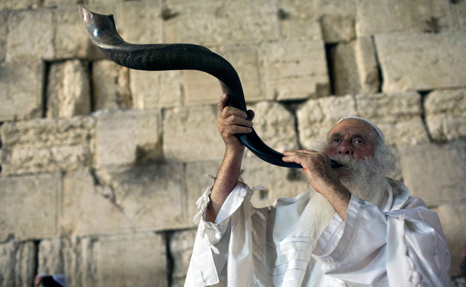Standing before God: Reflections on Yom Kippur
Why is Yom Kippur the most significant day on the Jewish calendar? What explains its appeal even to people who define themselves as "secular"? IDI research fellow Yair Sheleg shares his thoughts on this matter.

Yom Kippur harbors a great mystery: How did this day—which has no form and no beauty and is essentially a series of abstentions—turn into the most significant day on the Jewish calendar? Moreover, how did it become so popular? How did it become a day when even people who stay away from anything related to religious life during the course of the year go to synagogue, fast, and would not dream of driving, even though these observances are not required by civil law?
The answer appears to be that the fact that there are no meals and no parties on this day, and it is a day of ignoring our bodily needs and attending synagogue instead, is the origin of the day's appeal. Because it transmits the power of standing naked—totally revealed—before God. And this naked appearance is such a powerful and universal experience that few people can resist the temptation to experience it, even if only for one day a year.
As with all significant human phenomena, the source of this experience seems to be the confrontation with death. After all, human beings are the only creatures in the world that are aware they their existence is fleeting and that they are heading towards their deaths. And this traumatic awareness is the foundation of all of human experience. It underlies the urge to have children; it underlies human creativity and development. Everything is based on a desire to leave some kind of mark on this world, in a sort of desperate attempt to vanquish death—even if only just a bit.
So too, belief in God and the experience of standing before God stem primarily from a confrontation with death and everything related to it—diseases, wars, natural disasters. It is not by chance that in every culture, funeral and mourning rituals—more than any other ceremonies—have a religious character, even when they are defined as "secular." It is not by chance that even people who are seemingly light-years away from religious faith—including people who prefer to celebrate their lifecycle events in a "civil-secular" manner—conduct funerals and engage in mourning practices that are derived from religious traditions, even when the ceremonies themselves are seen as "secular." It is not by chance that people who are facing death—the elderly, people with terminal illnesses, soldiers in the field—tend to pray and experience an increase in their level of faith, regardless of where they place themselves on the spectrum of religion and secularism.
For "God" is a codeword for all the superhuman forces that shape our lives—the forces that have the ability to shape our lives even more than the most amazing scientific and technological developments of the modern era. These superhuman forces grant us life and sentence us to death; it is these forces that determine the time and circumstances of our death—"Who will live and who will die, who will die at his predestined time and who before his time." It is these forces that determine the weather that we will experience during our lives and in each season, and whether the planet on which we live will continue to exist.
By this definition of "God," there is not a single atheist alive today. There is no one now—nor has there ever been anyone—who does not believe in the existence of superhuman forces that are beyond our control. This is not only a matter of "faith." There is no one now—nor has there ever been anyone—who did not or does not know that these forces indeed exist and that they have the power to shape our lives more than any scientific-technological capability ever developed by humankind. This is why all of us—secular and religious alike—tend to pray when we have a transcendent awareness of our dependence on these forces. This is the crux of the experience of standing before God in general and is the essence of the Yom Kippur experience.
May the entire House of Israel, the Syrian people, and everyone the world over be sealed for a good year.
Yair Sheleg is a Research Fellow at the Israel Democracy Institute, a features writer at the Israeli religious weekly Makor Rishon, and a columnist at the daily Ma'ariv
This article is an excerpt from a Hebrew feature published in Maariv on the eve of Yom Kippur, 5774 (September 13, 2013).
